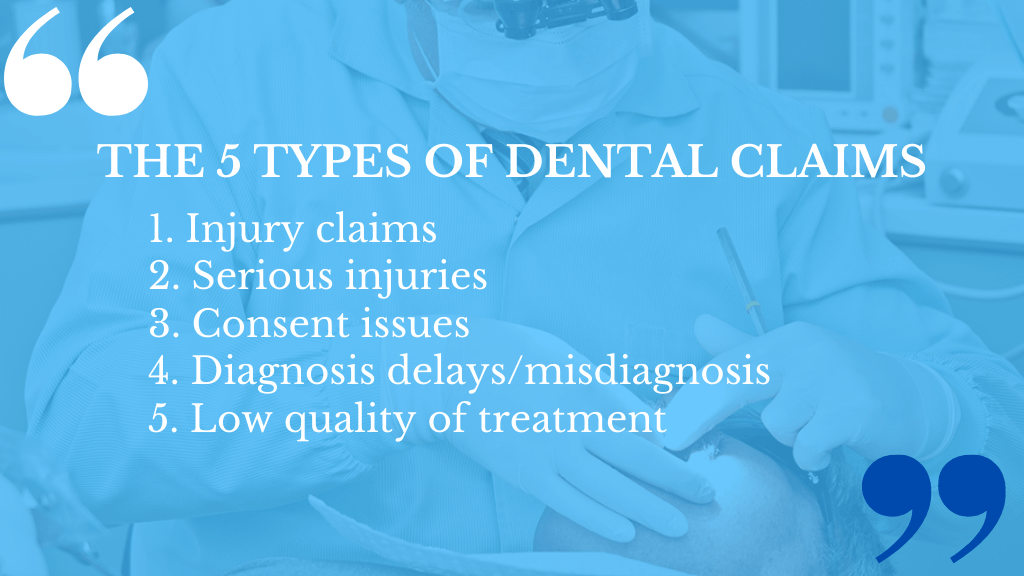5 Types of Dental Claims (UPDATED)
October 22, 2018
UPDATED: 5 Types of Dental Claims
Be honest: do you know the different types of dental claims you can make for compensation? In fact, you may have a case to make a claim for Dental Malpractice. Especially if you recently made a visit to a dentist and are coping with an avoidable injury.
Simply put, there are cases where a registered dental practitioner either performs their role:
- poorly;
- inappropriately, or;
- negligently.
As a result of the situation, you suffer avoidable harm. If so, there’s a reasonable chance that you’ll be able to make dental negligence claims for compensation.
In short, dental negligence receives the same value as all medical negligence. As such, the potential for pain in dental treatment means that every dental professional has a duty of care. That holds when it comes to their legal requirements for keeping you safe from harm.
There are five common types of dental claims. Moreover, knowing them may help you determine whether you have a case for compensation.
The five types of dental claims
1. Injury Claims
Malpractice and negligence are the key factors to consider. If procedures are unprofessionally or incompletely done, or even misdiagnosed issues, can result in long-term suffering. For instance, there are injury claims issues like these.
- First, the unnecessary severing of nerves;
- Second, the pulling or even removal of an incorrect tooth;
- Third, even the failure to diagnose tooth decay, and;
- Fourth, other types of dental problems such as gum disease.
In short, these are all potential reasons to make a dental negligence compensation claim.
2. Serious injuries
If your injury from dental procedure/examination brings serious harm, it can cause your life to change dramatically. Serious injuries are those that will have long-term and drastic consequences.
There are many causes that can lead to infections in dental negligence.
- For instance, there might be unsafe environments or practices;
- Also, the failure to diagnose oral cancer, or;
- Even simply using the wrong tools to carry out dental work.
All of these examples can result in you being able to make a claim. We value compensation in accordance with your specific circumstances.

3. Consent issues
Your dentist has the legal responsibility to let you know of any potential risks that may be involved with any dental procedure. You should be fully aware of risks with the procedure itself or with any of the subsequent treatment options such as medicinal side-effects.
If your negligent dentist has not gone over the risks and you suffer from any negative results of your treatment, then you have adequate grounds to make your claim for compensation.
4. Diagnosis delays and misdiagnosis
In theory, a dentist should be able to identify and treat issues as quickly as possible. Delays in treatment can very often make any existing issues considerably worse.
Early diagnosis is essential when it comes to a dentist’s care of duty, and failing to identify a potential issue that could lead to you making a claim. Misdiagnosis claims can also lead to complicated cases, especially if the incorrect treatment leads to further injuries or suffering.
5. Low quality of treatment
Qualified dentists should have a basic level of treatment. Therefore, when a dentist/orthodontist with little experience offers treatment, you can easily fall victim to new injuries.
Some other types of dental claims to be aware of
In short, dental negligence cases aren’t restricted merely to these five types at the end of the day. Truthfully, there are a variety of different claims for dental negligence that require the services of leading dental negligence solicitors.
Below are a few more types of dental negligence that are definitely worth keeping on your radar. For varying styles of dental care, the amount of compensation available for such personal injury could be worth it.
Wrong Tooth
Sometimes, your oral surgery ends up leading to wrong tooth extraction. In fact, it’s more common than one might think: the NHS lists several incidents at different trusts nationwide each year. This is according to figures you can find here from an official NHS Annex report.
If you’re reticent about pursuing even pursuing a compensation claim, put on the negligent dentist’s shoes for a moment. An NIH survey reveals that only half of the dentists even tell (or document for) their patients that the mishap took place. Now, juxtapose that against the possibility they might do it again to someone else who has no reason to suspect they’re dealing with a negligent dental practitioner.
Therefore, if everything checks out, think about a claim as an obligation to any patient that negligent dentist sees heretofore.
Root Canal Treatment
Our medical negligence solicitors also help with failures in root canal treatment. Such pain and suffering from these mistakes can be devastating to your oral well-being.
For instance, during treatment, certain protective guards might not be applied (or applied correctly, for that matter. In turn, such mistakes can lead to unnecessary infections. Also, a root canal treatment could enable:
- poor filling issues;
- broken instrument dislodging or embedding (without informing the patient), or;
- even failure to repair a damaged nerve.
Nerve Damage
One final dental negligence issue is nerve damage, specifically lingual nerve damage. In essence, such damage typically goes away fairly quickly, so there’s no need to be rash in pursuing a claim. It’s the situations, in contrast, where the loss of taste and salivation production after several months appears that you have a lingering problem.
Your next move
While making claims that prove the negligence of your dentist can be daunting, it can often be essential when it comes to your recovery needs. If you need financial support after your negligent treatment, then it is wise to contact a medical solicitor as early as possible.
The faster that you can make your claim, the quicker you may receive your financial compensation.
